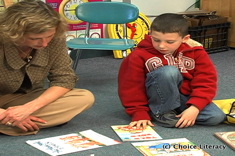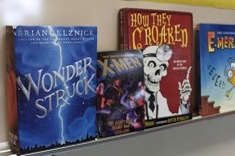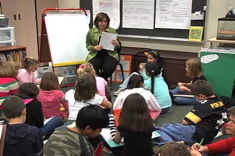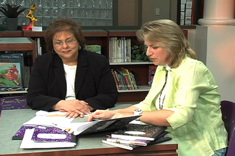Every mother can relate to this maternal wisdom: The car is a perfect place for insightful conversations with your child. When my seven year old waits to share exciting news, secret concerns, or silly stories from the back seat, I am pleased but at the same time I wonder if she has figured out that drive time is a safe time to share her thoughts; has she decided and discovered that her A-type, energized teacher-mom cannot over-react, over-analyze, or over-talk while driving? I always try and take the time to journal about the car lessons my child shares as I wrestle with the universal parenting/teaching dilemma: when do you need to be the involved expert and when do you need to be a quiet listener? How long do you let a child struggle before you step in with your knowledge and experience? When does your child need to work through a situation independently? Learning to give a child space and time are lessons that have served me well both as a mother and teacher.
Two weeks ago was parent-teacher-student conference night and my daughter, Anna, shared her second grade portfolio with me and my husband. She discussed her proud moments from the first 2 months of school, displayed the excitement of learning with her amazing teacher and peers, and clearly stated her learning goals for the coming months. During her student-led conference, Anna continuously hugged a novel and kept reminding us that she loved to read and repeated at least 10 times during the conference: "I read chapter books now." Her enthusiasm and confidence thrilled us and made us so grateful for her current teacher, a woman that believes children need a classroom community that fosters choice and learning from life experiences that ultimately lead to confidence and independence.
Later that evening my husband examined the novel, There's a Boy in the Girls' Bathroom, and asked me if this was a good book for a second grader. My answer didn't contain a tidy diagnosis for my practical geologist/engineer husband. "She can read it and build patience with it, but at this point in her reading life, that book is a great mistake." I answered. He pondered my answer and said, "I have no idea what that means, but (BIG PAUSE) I trust your judgment." He wandered over to his guitar and started humming and playing the tune, "Wide Open Spaces," a song shared by the Dixie Chicks. "She needs wide open spaces, room to make her big mistakes . . ." He simply smiled, knowing this was more than Anna's struggle, but as usual, he had the sense to stop talking. In my head and heart, I promised to give my child the same trust and support with her great mistake.
My daughter attends second grade at the school where I teach and during our ride home we share stories from our day. I discuss news about my students and classroom with the idea that my words might spark a conversation. Covert prompts work on some days and I will admit that on other days I resort to questions like: What did you read today? What stories did your teacher share? Following our conference and my secret concerns about her novel choice, I asked this question on successive days: "So, how's that new chapter book going?" She gave safe answers: "Great! I love it!" Then she would launch into another subject. I maintained my vow of silence and I left the topic alone. I wanted to trust her judgment give her the room and time to work through her reading dilemma. I did not question her book choice and tell her that I was worried the book was too hard for her. I did not explain that a reader needed to have the age and background knowledge to appreciate the humor and life lessons found in the book. I wanted to believe that my silence would give Anna an opportunity to grow as a learner while making a discovery about her own life as a reader.
My patience paid off. One Wednesday, after staying late for our school's gardening club, we jumped into the car and for once I was silent thinking about how I was not in the mood to cook dinner. I was thinking about how I had just helped to prepare 6 garden beds for our new community garden when the question came from the back seat: Mom, have you ever stopped reading a book? I tried not to smile. "Sure, I've quit reading lots of books." I knew to stop talking and to let her finish. "Guess what-me too! I decided that There's a Boy in the Girls' Bathroom is just not the book for me. I mean, I can read the words and stuff, but I was just not getting the story. It just wasn't making too much sense to me and I just didn't get excited about reading time like I usually do each day."
"So what did you do?" I asked. She went on to explain how she found other great books to read and that her teacher introduced her to a new series; she added that she loved the new books and could not wait to read all of the other books in the series. "So what did you learn when you decided to put, There's a Boy in the Girls' Bathroom, back on the shelf?"
"Oh lots," she answered. "I figured out that reading or saying the words doesn't really mean you are reading-you need to know what's going on in the story too. I didn't have anything to say about the book; I just didn't get the story. You know, if the book had been about animals like the stories in the Kittens in the Kitchen (Animal Ark Series #1), I might have finished the book. I just didn't get into the story. And guess what-that's okay. When I am older, like 4th or 5th grade, I can try the book again because by then it might be a just-right book for me. I am much happier with my new books.
I felt my shoulders relax and I exhaled my worries through the sunroof of my VW Bug into the dusky October sky. By trusting my instincts, Anna's mistake became the opportunity she needed at this point in her reading life. She created a meaningful, living definition of "just-right" books for herself. She now understands and believes that readers should expect great things from themselves and their books whenever possible. I am grateful that I kept my vow of silence and gave Anna time to wrestle with growing up. I was relieved her teacher did not intervene because the struggle supported her growth and independence as a learner. Anna needed to know what it felt like to select a book intended for someone else and she needed to decide what to do in order to move on as a reader. As parents or teachers, it is our first instinct to remove problems and replace difficulties with teachable moments and mini-lessons that we think will help our children. And many times our instincts prove to be true. There are also times when we must step back and give children "wide open spaces" and our support of silence; they need and deserve opportunities to try and transform those great mistakes into unexpected wisdom.
~~~~~~~~~~~~~~~~~~~~~~~~~~~~~~~~~~~~~~~~~~~~~~~~~~~~~~~~~~~~~~~~~~~~~~~~
"And one more thing Mama, if you don't mind, I think tonight would be a great night for pizza." Smiling and singing in my head, I clicked the directory of my cell phone, and had Anna place the order.









